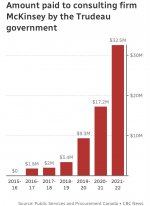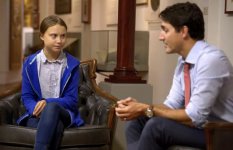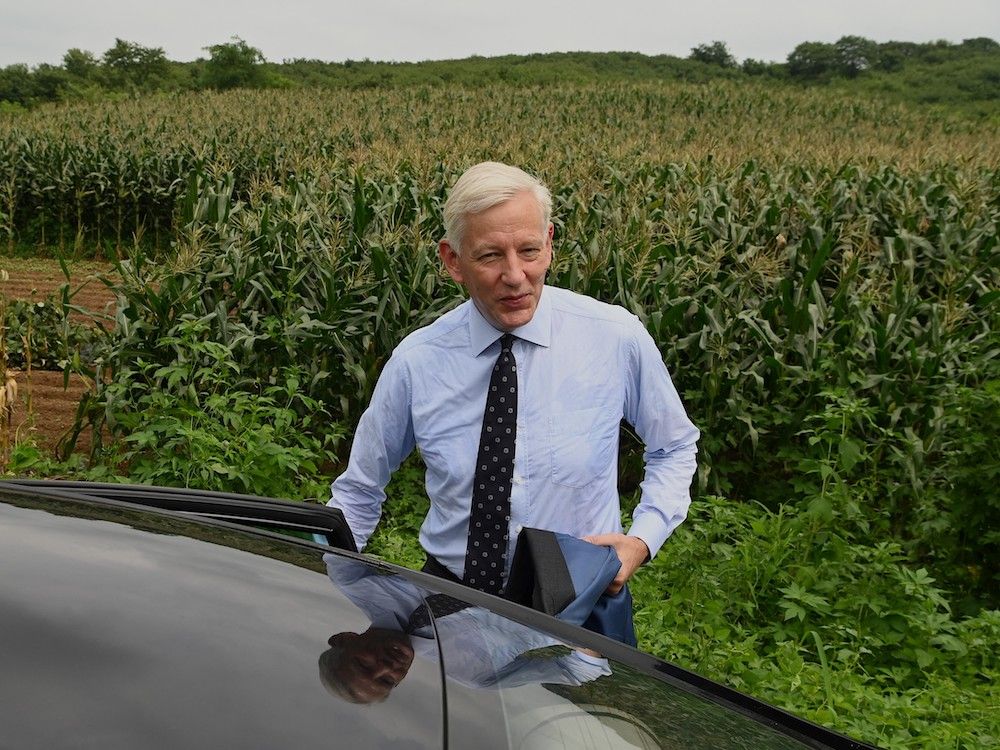In the nine years of the Harper government, McKinsey was awarded $2.2 million in federal contracts. During Trudeau's seven years in office, the company has received $66 million from the federal government.

McKinsey & Co. — a multi-billion dollar global consultancy firm with five locations in Canada —only scored the occasional contract with the Canadian federal government in the years preceding the 2015 election of Prime Minister Justin Trudeau.
In the seven years since, Radio-Canada
investigators uncovered $66 million in mostly sole-sourced McKinsey contracts, including $24.5 million to provide “management advice” to Immigration, Refugees and Citizenship Canada.
Immigration rates were already hovering at historic highs when Trudeau first took power. The number of new Canadians coming in each year had steadily risen
throughout the 2000s, ultimately peaking above 250,000 in 2015, the last year of the Conservative government of Stephen Harper.
But that figure has since expanded considerably, reaching
431,645 new permanent residents in 2022. It’s a quantity of immigrants that surpasses even the meteoric heights seen during the years immediately preceding the First World War, when hundreds of thousands of European immigrants were moved in to homestead the prairies.
The Trudeau government didn’t campaign on a dramatic rise to immigration rates – and it’s not clear they had any intention of doing so upon taking power.

But according to Radio-Canada’s IRCC sources,
it was McKinsey – and particularly its then-global head Dominic Barton – who successfully pitched high immigration as a means to boost economic growth.
(The
Century Initiative (
French: Initiative du Siècle) is a
Canadian charity that aims to increase Canada's population to 100 million by 2100. This would include increasing the population of "Mega-regions", such as the
Greater Toronto Area, from 8.8 to 33.5 million, the
Greater Vancouver region, from 3.3 to 11.9 million, and the
National Capital Region, from 1.4 to 4.8 million.)
Notably, Barton is a co-founder of The Century Initiative, an advocacy group pushing for Canada’s population to surpass 100 million by 2100. “Growing our population to 100 million by 2100 would reduce the burden on government revenues to fund health care, old age security, and other services,” reads part of the initiative’s
mission statement.
Barton would eventually serve as the Trudeau government’s ambassador to China from 2019 to 2021, and left
amid criticisms that he had been too eager to secure trade ties with Beijing at the expense of national security.
Most Canadians will know Barton only as our ambassador to China through the nearly three-year ordeal of Beijing’s kidnapping of Michael Kovrig and Michael Spavor. When that humiliation was over, quite a few Canadian opinion-makers fell for the story that Barton played some key role in negotiating the Michaels’ release.
He didn’t, as an exhaustive investigation undertaken by the Wall Street Journal,
published last week, amply proves. But it is a new book by New York Times reporters Michael Forsythe and Walt Bogdanich,
When McKinsey Comes to Town: The Hidden Influence of the World’s Most Powerful Consulting Firm, that casts Barton in an even clearer light.
It was during Barton’s decade as global managing director for McKinsey and Associates that the company became notorious for serving kleptocrats and oligarchs from Moscow to Riyadh and from Beijing to Johannesburg. While Trudeau’s infatuation with China was already a family tradition, Barton’s formulae situating Chinese markets and money as the keys to Canada’s prosperity were built into Trudeau’s program
long before he was prime minister — it was all right there and ready to go when he was running for the Liberal Party leadership.
It was Barton who served as
chair of former finance minister Bill Morneau’s Advisory Council on Economic Growth, and McKinsey provided the council’s research and resources —
FOR FREE. (That sure seems to have paid off!!!) When Trudeau first drew the adulation of the rich and famous at the World Economic forum in Davos — the heyday of Trudeau’s fancy-socks phase — it was Barton who introduced him.
McKinsey’s Canadian legacy, particularly the Trudeau government’s catastrophic early zealotry in the cause of normalizing relations with Russia and integrating the Canadian economy with China’s appetites and requirements may be most evident in the recent declamations from Trudeau, Deputy Prime Minister Chrystia Freeland, and Innovation, Science and Industry Minister Francois-Philippe Champagne. We’ve changed, honest we have, the three of them have been lately yelling at President Joe Biden’s administration in Washington.
New book brings Canada's former ambassador to China into clearer focus

nationalpost.com
Trudeau is now extolling Canada’s virtues as a place where the free world can obtain vital mineral resources (
except Western Canadian Petroleum Resources of coarse) without having to bend the knee to Russian or Chinese gangsters and slaveholders. One half expects him to invoke the dreaded Reform Party term “ethical oil.” Freeland has been loudly echoing every sentence US Treasury Secretary Janet Yellen has ever uttered that contains the word “friendshoring.” Champagne has gone so far as to resort to the term
“decoupling” in relation to trade with China — a word that not long ago would get you dismissed in Liberal circles as some sort of grubby eccentric from the McCarthy era.
It’s not just outrageous but otherwise run-of-the-mill corporate sleaziness that makes When McKinsey Comes to Town such a necessary guidebook to corporate depravity. Seriously, check out the link above.
It was all very exciting for Canadians to watch the news when former U.S. president Donald Trump’s campaign chairman Paul Manafort was convicted of financial fraud and all his greasy dealings with Vladimir Putin’s puppets in Ukraine were laid bare. But little if any notice was paid to the role Barton’s McKinsey was playing at the same time in Ukraine, pimping Moscow’s man in Kyiv, Viktor Yanukovych, as the candidate to vote for. Ukrainians have been paying the price for that episode ever since.
While tinpot regimes in the Global South were being drawn deeper into the leghold traps of crippling debt through Beijing’s Belt and Road initiative, Barton was serving as Xi Jinping’s megaphone, regurgitating the lie that the Chinese Communist Party’s imperialist project had nothing to do with its geopolitical strategies; it was just good business….
& Trudeau made this dude Canada’s Ambassador to China…
A mere few months elapsed between his departure from McKinsey and his job as Canada’s ambassador to Beijing, but it was enough time for Barton to take on the job as chairman of Teck Resources — a Canadian coal-mining giant partly owned by China’s sovereign wealth fund. Teck’s main clients: China’s coal-burning steel mills. A fun fact you’ll find in When McKinsey Comes to Town: When you take into account the coal its customers burn, Teck produces the equivalent of ten per cent of Canada’s entire greenhouse-gas output.

Barton has since gone on to serve as chairman of the board of
Rio Tinto, the world’s second-largest mining company. In keeping with policies Barton championed when McKinsey was running Morneau’s advisory panel on economic growth, Ottawa is paying out $220 million to Rio Tinto to help “decarbonize” its operations in Sorel-Tracy, Quebec.
Meanwhile, last week, the varsity-league consultancy Eurasia Group announced that it will be taking on Barton as its “strategic counsellor.” BARTON will be joining
GERALD BUTTS, Trudeau’s former principal secretary, who resigned in the wake of the SNC-Lavalin scandal, and who joined the Eurasia Group’s media wing last month.
(Dominic Barton, is married to Geraldine Buckingham. Check out who she is…)



